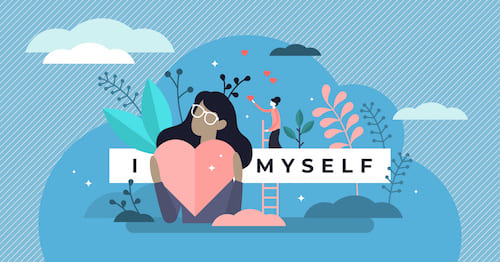November 01, 2019
By Emily Metcalf
 Healing from mental illness requires a long journey of acceptance. Those with mental illness must accept who we have become. We must learn to accept disability and learn to live with stigma. We must learn to not hate ourselves for what we might perceive as weakness. Maybe we will even learn through the process of accepting our illness that what we thought of as weakness has brought us strength. We might learn to love ourselves more for enduring hardship, becoming strong and gaining wisdom.
Healing from mental illness requires a long journey of acceptance. Those with mental illness must accept who we have become. We must learn to accept disability and learn to live with stigma. We must learn to not hate ourselves for what we might perceive as weakness. Maybe we will even learn through the process of accepting our illness that what we thought of as weakness has brought us strength. We might learn to love ourselves more for enduring hardship, becoming strong and gaining wisdom.
Decades may pass on this journey, and did for me. Decades of taking medication, getting my blood drawn, attending psychiatry and therapy appointments, trying to do chores or exercise despite symptoms and side effects, dieting despite the weight gain side effects, trying to drink less and learning to cope with the pain and grief instead of bottling it up. Decades of just trying to get by somewhat normally despite my extraordinary situation.
During those decades, I was continually working at healing. I was constantly working at improving my health both physically and mentally. And through that process I found purpose, and I learned about self-love.
Here’s what helped me on my journey.
From the beginning, there was a lot working against me on the road to recovery. I had to work through a lot of grief, shame, trauma and anger. But there were a few very important decisions and commitments I made that really made a difference.
I committed to my medication regimen. This sounds simple enough, but for many people, adhering to medication is a battle that goes on year after year. Many do not fully accept this type of treatment and its effects, and refuse to take their medication. Unfortunately for these people, this creates a large barrier on the road to healing, recovering and living in wellness.
I decided to take full accountability for my actions. This meant reclaiming “choice.” I had the ability to choose how I would approach healing, and I chose to take things one step at a time, to proactively deal with crises while practicing resilience and to always have hope for my situation.
I accepted therapy to aid me in dealing with the insurmountable grief, sadness, failure, resentment, anger, shame and rage about all that has happened because of my illness.
Slowly, I began to learn to take care of my body, as the body and mind are connected. Basic wellness not only involves physical health, but also involves learning or relearning the basic skills of life. Hygiene, basic chores like cleaning and doing laundry, working a simple job and keeping it despite reoccurring symptoms and episodes, making friends regardless of feeling like I didn’t know who I was post-diagnosis.
And, all the while, working over and over, harder and harder, at accepting the illness.
There is always more to learn about self-love and acceptance. There is always another layer or habit to pick away at, quit or build up. We are constantly making discoveries about ourselves and how to heal and improve. We are constantly rediscovering or inventing our identity, healing even older and deeper layers of trauma, and finding undiscovered dreams. I am at that place in life now. I am learning to dream again.
A key, I believe, is not feeling attached to old dreams that I discarded, but discovering the new — discovering who I am now. Because I am changed.
All of this, all the deep mud that we have slogged through, all the healing that has taken place, it has changed us. It is time to dream new. It is time to rediscover what dreaming is all about, and what it feels like to pursue these dreams and truly believe in ourselves no matter where we have been, what we have seen, how old we are or any physical obstacle. I look forward to thoroughly engaging in this next phase of healing, living and becoming who I am truly meant to be.
Emily LeClair Metcalf is the author of “Glass Slippers: A Journey of Mental Illness” (Dog Ear Publishing), and currently writes on her blog, welcometothegrit.com, about her spiritual, creative and healing experience while living with schizoaffective disorder – bipolar type. She lives on Lopez Island, Washington.
We’re always accepting submissions to the NAMI Blog! We feature the latest research, stories of recovery, ways to end stigma and strategies for living well with mental illness. Most importantly: We feature your voices.
Check out our Submission Guidelines for more information.
We’re always accepting submissions to the NAMI Blog! We feature the latest research, stories of recovery, ways to end stigma and strategies for living well with mental illness. Most importantly: We feature your voices.
LEARN MORENAMI HelpLine is available M-F, 10 a.m. – 10 p.m. ET. Call 800-950-6264,
text “NAMI” to 62640, or email. In a crisis, call or text 988 (24/7).